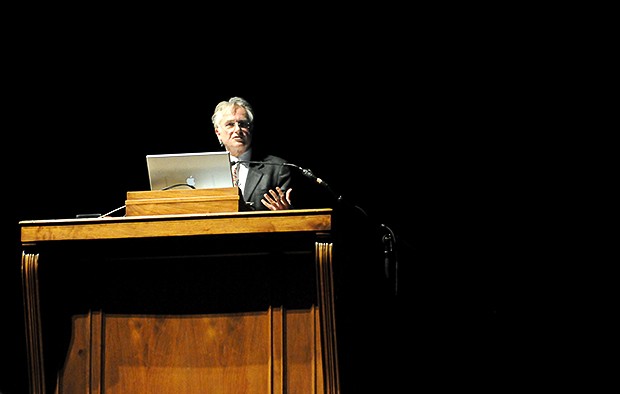After 13 years of Catholic schooling, Jeff CampbellâÄôs faith took a blow when he came across the work of evolutionary biologist Richard Dawkins during his junior year of college. âÄúThis was an argument I hadnâÄôt heard before,âÄù said the mechanical engineering graduate student, now an atheist. On Wednesday night, Campbell got a chance to see Dawkins in person when the world-famous religious skeptic visited the University of Minnesota to present his lecture, âÄúThe Purpose of Purpose.âÄù In front of a packed crowd in Northrop Auditorium, Dawkins outlined his theory on the tendency of the human brain, unlike that of other animals, to be molded to seek new goals beyond those of basic biology. âÄúOur brains are flexible enough to be reprogrammed away from the goals that are directly concerned with gene survival,âÄù he said, âÄúand toward a new and competent purpose, led by a religion, by patriotism, or a sense of duty or loyalty to a party or faith.âÄù Widely controversial for his outspoken criticism of intelligent design, Dawkins was a professor at the University of California-Berkeley and the University of Oxford until his retirement in 2008. He has written nine books, including the 1996 New York Times best-selling novel, âÄúThe God Delusion,âÄù which has sold more than 1.5 million copies in English and is published in 30 other languages. The event was organized by the student group Campus Atheists, Skeptics and Humanists, whose mission parallels DawkinsâÄô promotion of a skeptical worldview, Campbell, CASHâÄôs activities director, said. âÄúHeâÄôs talking about something we all share, which is ancestry, which is history, which is our evolution,âÄù he said. But not everyone who attended the lecture agrees with DawkinsâÄô theories. Ben Cornish, history senior and president of the Campus Crusade for Christ, said although he welcomes Dawkins on campus, Dawkins is misguided in his understanding of religion. âÄúHe tends to only see the worst things that come out of religion,âÄù Cornish said. âÄúHe tends to not even consider what good has come out of it.âÄù When faced with Christian opposition, Cornish said Dawkins immediately dismisses it as fundamentalism rather than considering the argument. PZ Myers, associate professor of biology at the University of Minnesota-Morris and faculty adviser for CASH, said everyone should pay attention to DawkinsâÄô message. âÄúHeâÄôs talking about science education and getting more people interested in real science,âÄù Myers said, âÄúand heâÄôs also opposing the dogma of religion.âÄù Senior physics major Craig Muckenhirn, a member of Campus Crusade for Christ, likened Dawkins to a corrupt politician who promises a lot but delivers very little. âÄúI just would caution people to listen carefully to his arguments and try to see through the eloquent speech in which he wraps them,âÄù Muckenhirn said. The event was sponsored by CASH, the UniversityâÄôs Department of Anthropology , Hillel Jewish Student Center, the Minnesota Atheists and the Richard Dawkins Foundation for Reason and Science. Myers, a personal friend of Dawkins, said he is persistent and asks difficult questions. âÄúI think thatâÄôs a good scientific approach to take,âÄù he said. âÄúIf you want to advance something, the place to start is by asking good questions.âÄù











